A | ADVANCED PRACTICES OF RESPONSIBLE INVESTING
Exchanges contribute significantly to raising capital for improving sustainability. They also play an important role in in creating financing facilities to help modernise the economy in line with climate goals.
As a member of the Sustainable Stock Exchanges (SSE) initiative, Moscow Exchange works hard to develop sought-after financial ESG instruments and promote them among Russian companies, investors, and financial institutions. Moscow Exchange is striving to create a new market segment for environmentally and socially significant projects that are appealing for issuers and investors.
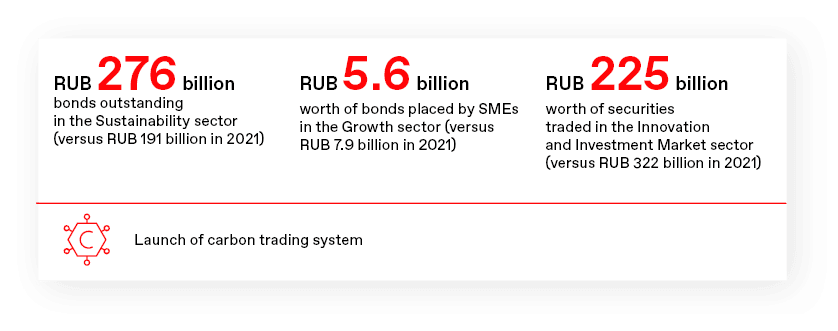
Moscow Exchange promotes responsible investment both as a company and as a provider of financial infrastructure, recognising that the generation of long-term sustainable returns is dependent on well-governed social, environmental, and economic systems.
Moscow Exchange Group also promotes modern corporate reporting requirements, thereby contributing significantly to more transparent markets. The Exchange has developed infrastructure to foster a local investor base, and it provides access to funding for innovative companies, as well as small and medium-sized enterprises.
FN-EX-410a.3 3-3
- changes related to the company’s financial health;
- major corporate transactions, including restructurings, mergers, and acquisitions;
- changes to the management team;
- positive or negative material information on issuers’ products and services;
- legal or regulatory changes affecting the issuers’s ability to conduct business.
The grounds for suspending trading in securities are set out in the Listing Rules of Moscow Exchange. The decision to suspend trading in securities is made by Moscow Exchange on the basis of an expert opinion issued by the Listing Department. The Exchange contributes significantly to increased transparency of disclosures through its requirements for issuers.
3-3
As part of the work of the Bond Issuers Committee and user committees, the Exchange performs regular analyses of feedback from customers and market participants about new ESG products; it also works to increase their awareness on such topics.
This subsection covers the key responsible investment instruments of Moscow Exchange and its educational programmes for market participants.
Moscow Exchange Group’s objectives and the UN Sustainable Development Goals:
- SDG 8.3, 9.3 Increase growth opportunities and access to financial markets for small and medium-sized enterprises
- SDG 8.10 Develop financial infrastructure for better access to capital markets, promote the development of a local investor base
- SDG 9.1 Increase access to financial services for retail investors
- SDG 9.b Increase growth opportunities and access to financial markets for companies that develop innovative products
- SDG 12.6, 12.8 Improve the quality and quantity of ESG information disclosed by issuers
- SDG 12.6, 13.3 Develop instruments to promote responsible investment
Major highlights in 2022
For comprehensive performance metrics for 2020, 2021 and 2022, see the Advanced Practices of Responsible Investing subsection of the Sustainability Data section. For the key policies, procedures, and responsible departments, see the Advanced Practices of Responsible Investing subsection of the Sustainability Approaches and Procedures section.
Sustainability sector
3-2 203-2
In 2019, Moscow Exchange Group established the Sustainability sector to help issuers raise funds for projects that comply with the UN SDGs and national projects of the Russian Federation. The Sustainability sector consists of four segments: green bonds, social bonds, sustainability bonds (as of 2021), and a segment for national and adaptation projects. For more details on the Sustainability sector and its core listing rules, see the Sustainability Approaches and Procedures section.
The creation of such sector is in line with the global best practices and represents one of the most important steps for Moscow Exchange as part of the UN initiative of SSE. About 130 exchanges take part in the initiative with only 46 of them currently having such a listing category.
As more and more investors prefer sustainable projects targeting the improvement of ecology and social environment, the Russian business is increasingly thinking about corporate social responsibility and application of the ESG principles in their operations. The sustainability sector will provide for proper positioning of issuers and investors with the targeted nature of investments.
As of 31 December 2022, 27 issues of ESG bonds of 17 issuers were in circulation in the Sustainability sector.
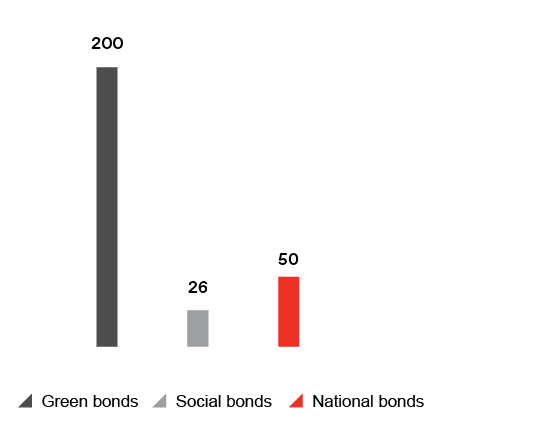
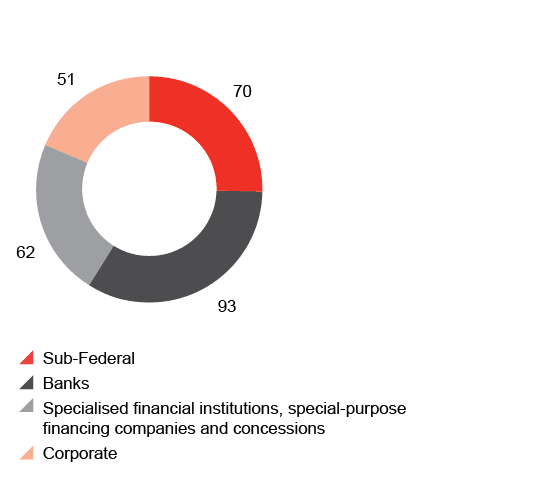
Building a market for trading in carbon units
The carbon unit register operated by Kontur JSC has been functioning in Russia since September 2022.
The carbon unit is a verified implementation result of the climatic project expressed as a mass of greenhouse gas equivalent to 1 tonne of carbon dioxide.
The first climatic project was registered and the first carbon units were issued in the same month. DalEnergoInvest Company from the Sakhalin Region acted as the project contractor. The Russian Energy Agency of the Ministry of Energy of the Russian Federation (Minenergo of Russia) coordinated the structuring of the first transaction for the sale of carbon credits.
On 26 September 2022 the first exchange transactions were carried out with carbon units at the NAMEX. Exchange trading in carbon units is organised as a commodity auction: the vendor of carbon units sets the starting price and buyers participate in competitive bidding by increasing their bid prices. At the end of the first day, two deals were concluded purchase and sale with a total volume of 20 carbon-units. Weighted average selling price amounted to 1 thousand rubles per carbon unit. An interest is currently being observed in registering carbon units by Russian companies implementing projects to reduce their own carbon footprint.
Companies, which strategies include achieving carbon neutrality, are also interested in the carbon market as a means of reducing their carbon footprint.
ESG guidelines
3-2 203-2
Education and information of financial and commodity markets participants on the ways to integrate the ESG principles into the companies’ operations is an important mission for stock exchanges all over the world. Moscow Exchange meets that role by organizing a conference sessions and webinars, as well as by supporting similar events of its partners.
The first Guidelines for Best Sustainability Practices (ESG Guidelines) published in 2021 by Moscow Exchange was positively received by issuers seeking to follow the sustainability principles. That is why a decision was made in 2022 to update the ESG Guidelines in order to reflect modern ESG trends. In particular, the updated ESG Guidelines included the description of the market for exchange trading of carbon units, the latest trends towards harmonisation of non-financial reporting and the specifics of the non-financial and climatic information disclosure, as well as new aspects of corporate sustainability through the biological diversity support and supply chain management. In addition, the ESG Guidelines were supplemented by detailed instructions on how to prepare for the release of ESG in the Sustainability Sector.
Moscow Exchange believes that the ESG Guidelines may be used as a benchmark in the course of developing or improving corporate sustainability strategies, which will contribute to improving the quality of company management. The fact that some 300 participants joined the presentation of the ESG Guidelines proves its importance for the Russian market.
ESG indices
3-2 203-2 FN-EX-410a.4
Moscow Exchange Group calculates and tracks Russia’s first sustainability indices. This is a joint project with the Russian Union of Industrialists and Entrepreneurs (RSPP). The MOEX-RSPP ESG indices help reveal a correlation between the quality of disclosures on responsible business practices and the yield dynamics of issuers’ stocks.
3-3
Each year, RSPP evaluates reports and ESG indicators of companies with considerable market capitalisation operating in Russia. Moscow Exchange stock indices are based on this evaluation, as well as their derivatives, which create the basis for ESG exchange-traded funds (ETF). Since January 2021, Moscow Exchange has been listed on the RSPP Responsibility and Transparency Index and the Sustainability Vector Index.
- MOEX-RSPP Responsibility and Transparency Index, MRRT (calculation is based on the stock prices of 25 issuers);
- MOEX-RSPP Sustainability Vector Index, MRSV (calculation is based on the stock prices of 21 issuers);
- MOEX-RSPP Sustainability Vector Total Return Index (calculation base includes companies with the best sustainability indicator dynamics, taking into account reinvestment of dividends);
- MOEX-RSPP Russian Companies Sustainability Vector Total Return Index (launched in 2021 based on the stock prices of 19 issuers);
- MOEX RSPP — RSHB Russian Corporate Eurobonds ESG Index (launched in 2021; based on the Eurobond loans of Russian corporate issuers listed on the MOEX-RSPP Sustainability Vector Index. The calculation of this index was temporarily stopped in April 2022).
A new version of the Sustainability Vector Index, the MOEX-RSPP Russian Companies Sustainability Vector Index. The methodology factors in regulatory requirements for non-state pension funds, making it possible to invest pension savings in a basket of index-linked securities or a financial product whose underlying asset is the new indicator.
FN-EX-410a.4
A total of 43 indicators were used to calculate the RSPP Responsibility and Transparency Index in 2022.
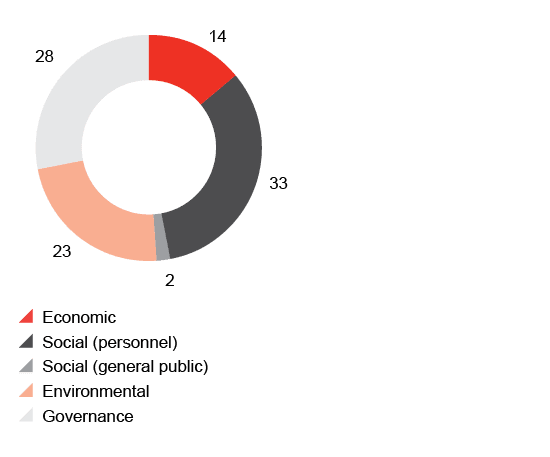
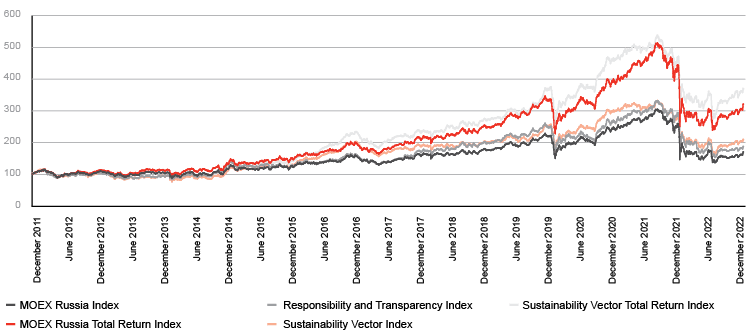
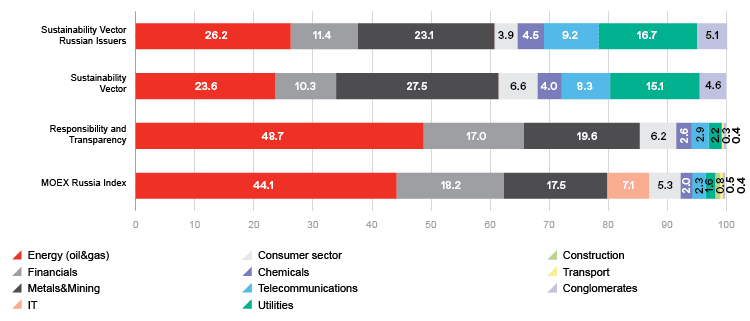
ESG ETFs
As of the end of 2022, the number of ETFs on the ESG indices of the Moscow Exchange amounted to six funds:
- ESGR ETF RSHB-MOEX-RSPP VecTR (ESGR);
- ESGR ETF RSHB-MOEX-RSPP Russian ESG Eurobonds (PRIE);
- SBRI ETF Responsible Invest (SBRI);
- WIMF ETF Russian Equity ESG (ESGEG);
- TSST ETF TINKOFF ESG LEADERS (TSST);
- ETF “Technologies of the Future” by “Sistema Capital” Management Company (SCFT)
Growth sector
3-3 203-2
In 2022 MOEX Group extended access to funds for small and medium-sized enterprises in the Growth sector, thereby facilitating their growth.
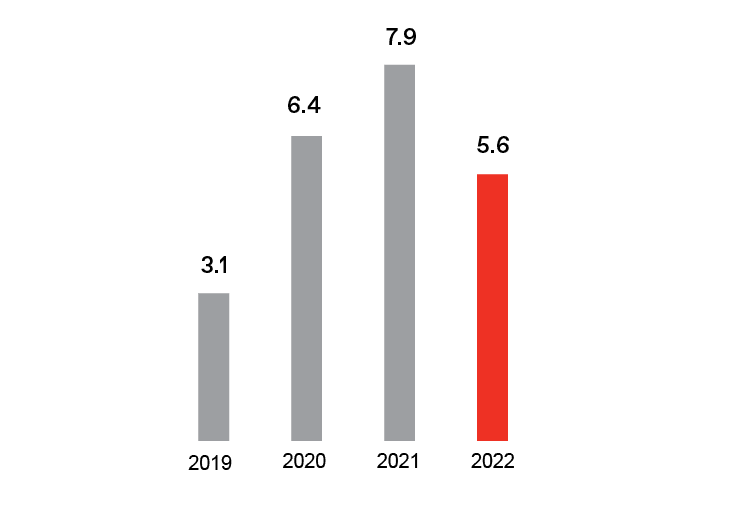
The Growth sector of Moscow Exchange was created for public offerings and for circulating the securities of promising small and medium-sized enterprises (for a detailed description of the sector and its listing rules, see the Sustainability Approaches and Procedures section).
To be included in the Growth sector, bonds need a credit rating of at least BB- on the Russian scale. In order to reduce the consequences of the negative impact of the geopolitical situation and increased volatility in the financial market, the Exchange made a decision, Moscow Exchange has decided to use until 1 October 2022 the credit ratings of the issuer, bond issue, or guarantor (endorser), assigned as of 1 February 2022. After the end of the credit rating grace period in the Growth Sector, the basic requirements for a rating of at least
As of 31 December 2022, 49 bond issues of 3 SMEs were traded in the sector. The total volume of SME bond placements amounted to RUB 5.6 billion.
To subsidise listing preparations, 25 issuers received received coupon-interest income subsidies with the total amount of subsidies exceeding RUB 420 million.
3-3
As a support measure, Moscow Exchange Group has improved accessibility to the bond market for SMEs by waiving charges for listing bonds for flotations of up to RUB 400 million. The grace period was extended up to 31 December 2023.
Innovation and Investment Market
3-3 203-2
Moscow Exchange contributes to the development of the innovation market by easing access to the financial market for high-tech companies. Moscow Exchange’s goal is to attract investment to innovative companies using its exchange mechanisms and through cooperation with development institutions.
By the end of 2022, 31 securities were being traded on the Innovation and Investment Market sector, including nine shares, 19 bonds, one exchange-traded fund, and one closed-end pre-IPO fund. The total capitalisation of the sector amounted to about RUB 450 billion. The trading volume exceeded RUB 225 billion

To encourage high-tech companies to list on the stock exchange, the following types of government support are available:
- tax relief on income from the sale or other disposal of shares and bonds of Russian entities, and of investment units that are securities from the high-tech (innovative) sector of the economy, provided that they have been continuously owned by the taxpayer for at least one year prior to the date of their sale;
- the tax incentive applies to share transactions in high-tech companies with maximum market capitalisation of RUB 75 billion, bonds of issuers with maximum annual revenues of RUB 75 billion, investment units (maximum net asset value (NAV) of RUB 75 billion);
- as part of the Take off –From Startup to IPOinitiative, approved by the Russian Government in 2022, small innovative enterprises will be eligible for grant support to co-finance innovative projects, with the grants to be provided by Federal State Institution Foundation for Assistance to Small Innovative Enterprises in Science and Technology. Each grant is capped at RUB 30 million; part of that amount may be spent on listing (legal support fees, investment banking services, marketing, and other services).
Plans for 2022
- to continue to develop the Sustainability sector by issuing new types of bonds; create platforms for ESG market data; extend the ESG index family; improve the non-financial reporting practices of issuers;
- to stimulate the increase of the number of climate projects that have registered carbon units with the Russian operator Kontur JSC with subsequent sale on NAMEX;
- to host more educational events for issuers and market participants to share knowledge and experience in ESG management and responsible investment;
- to improve the Group’s own ESG practices and sustainability reporting system;
- to meet KPIs under the national SME projects in terms of the size of securities offerings;
- to implement the Takeoff — From Startup to IPO government initiative at the IIM Sector.
